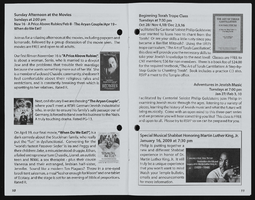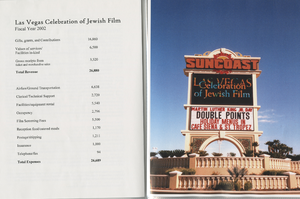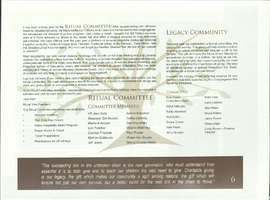Search the Special Collections and Archives Portal
Search Results

Congregation Ner Tamid pamphlet: "A Sweet Year of Programming & Events, 5769 (2008-2009)"
Date
Archival Collection
Description
A Sweet Year of Programming & Events pamphlet for adult education, family programming, and special events from Congregation Ner Tamid on the Greenspun Campus for Jewish life, learning, and spiritual renewal. The pamphlet includes information on news, meetings, events, statements, and book reviews.
Mixed Content

Transcript of interview with Harry Sax by Barbara Tabach, April 8, 2015
Date
Archival Collection
Description
Interview with Harry Sax by Barbara Tabach on April 8, 2015. In this interview, Sax discusses his family history and upbringing in Chicago, and his military service in Munich. He returned to Chicago and became business partners with Michael Schulson, with whom he opened several Arby's outposts, and expanded to Las Vegas in 1968. He talks about life in Las Vegas in the 1970s and the competition in the fast food industry. He then talks about the reform congregation in Chicago and his connection to Judaism throughout his life. He describes himself as a "closet Jew" before becoming president at Congregation Ner Tamid in 2007. Sax discusses the programs at Ner Tamid for all ages, and his continued involvement in the community.
In 1939, Harry Sax was born in Chicago, Illinois, the son to first generation American Jews. He spent his childhood on Chicago's South, where his family belonged to a progressive Reform congregation. After graduating from Hyde Park High School, he continued his education at Indiana University. In college, Harry was a member of the ZBT Jewish fraternity, participated in a singing group, and was a cadet in the Reserve Officers' Training Corps. Upon graduating from college, Harry was stationed in Munich, Germany as a second lieutenant in the Quartermasters Corps. In addition to his required military duties, he also participated in an after-hours acting group; through this group, he was hired as an extra and for small roles, including The Great Escape. When he finished his service, Harry returned to Chicago, where he connected with a high school friend, Mike Schulson. The two became partners and purchased Arby's franchises in Chicago and Las Vegas. Thus, in 1968, while his partner remained in Chicago, Harry moved to Las Vegas and opened two franchise locations in two weeks. Though it took a few years to stabilize the business and overcome competition, he opened a third location in 1972 on South Decatur, what was then the western edge of the city. Today, Harry has nineteen locations in Las Vegas, with additional franchises in Reno and Barstow, California, and employs nearly 300 people. After about twenty years as a "closet Jew" in the city, Harry reconnected with Judaism and joined Congregation Ner Tamid in the late 1990s. He served on its board, eventually becoming vice president and then president (2007-09). He also dedicated himself to have a bar mitzvah, following up on his Jewish education and confirmation as a teenager. Harry has also served on the Anti-Defamation League's board as well as an active member of the Chamber of Commerce.
Text

Transcript of interview with Walter Weiss by Claytee White, November 2, 2010
Date
Archival Collection
Description
In this interview, Walter Weiss discusses how Judaism and boxing kept him out of trouble in his youth. Weiss grew up in the Boston area, and started boxing as a teenager. Weiss talks about his boxing training, becoming a runner for a bookmaker, and coming to Las Vegas in the 1950s to be a bookmaker for the Stardust Hotel, and working the slot machine floor. He had several different jobs in various casinos, and discusses different people involved in the gaming industry in Las Vegas.
Walter Weiss life story begins in a Malden, Massachusetts during the Great Depression. His early background was a blend of observant Judaism, secularism, and the effects of the era. He was a troubled youth whose older brother encouraged him to join him in boxing. As Walter explains: I was a wild kid and ... boxing saved my life. His aptitude for boxing led him to be a sparring partner in New York City's famous Spillman Gym. There he met and worked out with some of the greatest fighters of the era, including Rocky Marciano. He recalls how he turned professional while attending the University of Miami and how he first came to Las Vegas in 1958 to escape his personal troubles and find work with a local bookmaker. Thus began his diverse employment history in the casino industry. He details his various positions and the cast of famous and infamous characters of the times. For six years he return to New York and worked as a Wall Street broker before arriving back in Las Vegas in 1973. He talks about his property ownership, lobbying for an amendment to Senate Bill 208, his personal religious changes and a sundry of observations about the changes that occurred as the state took over gaming.
Text

Transcript of interview with Beth Molasky by David Shwartz, June 2, 2014
Date
Archival Collection
Description
In this interview, Molasky discusses her parents, Irwin and Susan Molasky, and growing up in Las Vegas as a member of Temple Beth Sholom. She attended Sunday school and Hebrew school, but is not particularly religious as an adult.
Beth Molasky-Cornell is a partner, shareholder, and an active member of the board of directors of the Molasky Group of Companies, which was founded by her father Irwin Molasky. She is a founding partner and a core member of the board of directors of Ocean Pacific Companies, a high-end real estate development firm founded by her husband Ken Cornell in San Diego, California. Molasky-Cornell contributed to numerous Molasky Group building projects, including the Bank of America Plazas, the Winterwood Corporation land development, and the Park Towers luxury condominiums. Molasky was born in Florida; however, her family moved to Las Vegas before her second birthday. She graduated from Valley High School in 1968, and started college at the University of Southern California at the age of seventeen. After spending a couple of years in Rhode Island, where she had her children, she moved back to Las Vegas in 1975. In this interview, Molasky discusses her childhood experiences in Las Vegas, especially as a member of the Jewish community, and reflects upon changes that influenced her children?s upbringing in the city.
Text

Las Vegas Celebration of Jewish Film scrapbook of brochures and pamphlets, 2002-2003
Date
Archival Collection
Description
Various brochures and pamphlets for the Las Vegas Celebration of Jewish Film.
Text

Annual report from Congregation Ner Tamid, 2013-2014
Date
Archival Collection
Description
Annual report from Congregation Ner Tamid, 2013-2014
Text

Transcript of interview with Valerie Wiener by Barbara Tabach, January 20, 2015
Date
Archival Collection
Description
Valerie Wiener is an accomplished state senator, business owner, president and founding member of the Public Service Institute of Nevada and the Valerie Wiener Foundation. She was born October 30, 1948 in Las Vegas, Nevada. Her service as senator for 16 years and her role as a public servant led her to become the first woman assistant majority leader of the state senate in Nevada. She graduated with a bachelor degree of Journalism at the University of Missouri/Columbia within the School of Journalism earning a Masters of Arts in Broadcast Journalism and a Master of Arts in Literature at the University of Illinois in Springfield while attending law school at McGeorge School of Law in Sacramento in the 1970s. Her generosity is also seen through scholarships and activities at the Louis Wiener Jr. Elementary School. In addition, Valerie is a professional speaker, consultant, and internationally published author. She is the recipients of many awards, such as: ?Women of Achievement Award? in Media; ?Healthy Schools Heroes?; ?Public Affairs Champion Award?; ?Legislator of the Year?, and the Nevada Secretary of State?s recipient of the ?Jean Ford Participatory Democracy Award.? She stays active through her commitment to the Nevada Senior Olympics for both Fitness and Weightlifting earning 17 gold medals from 1998 to 2007. In this interview, Wiener discusses her childhood and being raised in Las Vegas in the 1950s as well as the academic path that led her career into politics. She shares memorable insight into the life of her father, Louis Isaac Wiener, Jr., an accomplished attorney and business man who represented the infamous Benjamin ?Bugsy? Siegel during the construction and opening of the Flamingo Hotel and Casino in 1946. Throughout Wiener?s interview, she highlights the traditions of the small, but growing Las Vegas Jewish population in the 1960s. Among the people she recalls most vividly is her grandmother Kitty Wiener. Wiener also discusses her community service work and her life mantra of giving.
Text

Transcript of interview with Adele Baratz and Florence Frost by Barbara Tabach, May 19, 2015
Date
Archival Collection
Description
In this oral history interview, Adele Baratz and Florence Frost discuss their experiences as members of the Las Vegas Jewish community, particularly as it has evolved and grown over the decades.
Adele Baratz and Florence Frost discuss their experiences as members of the Las Vegas Jewish community, particularly as it has evolved and grown over the decades. As active members of the Temple Beth Sholom congregation, the two recall others that made significant contributions to the local Jewish community as well as programs that strengthened Jewish life, including Women?s League, Fifty-five Plus and the Hebrew Day School. In addition, Adele and Florence recall efforts to pressure the Clark County School District to accommodate absences for the High Holidays. Adele (Salton) Baratz was born August 11, 1926, to Russian immigrant parents. The family moved to Las Vegas when Adele was two years old, making her the longest residing Jewish resident in Las Vegas. Adele graduated from Las Vegas High School in 1944, and then attended nursing school at Baltimore?s Sinai Hospital, from which she graduated in 1947. While visiting a friend in Philadelphia, Adele met her husband, and the couple lived there for a few years. When the couple divorced, Adele returned to Las Vegas with her children, and eventually also returned to nursing. She retired from Sunrise Hospital in 1991, after 17 years. Florence (Levine) Frost was born March 24, 1929 in Brooklyn, New York. She married Robert L. Levine in 1949, and the two had three daughters. In 1960, Robert?s work as a decorator brought the couple to Las Vegas. Not long after moving, she joined Temple Beth Sholom, where she worked as an executive secretary for two years. It was at temple, as members of Women?s League, that Florence and Adele met. Florence was a two-term president of the Women's League beginning in 1970; established the Fifty-Five Plus Club for seniors; and served on the congregation's board of directors for many years. Florence?s other leadership roles in the Jewish community include: chair of the Anti-Defamation League committee of B'nai B'rith, president of the National Council of Jewish Women, and president of the Las Vegas chapter of the Brandeis National Committee (2010-2011).
Text

Transcript of interview with Rabbi Malcolm Cohen by Barbara Tabach, December 16, 2015
Date
Archival Collection
Description
In this interview, Rabbi Malcolm Cohen speaks about observed differences between British and American Jewish communities as well as new Temple Sinai initiatives to build community and engage younger congregants. Rabbi Cohen and his wife have two children, Elijah and Rachel.
Rabbi Malcolm Cohen was born on October 7, 1973 in London, England. He describes having the typical Reform Jewish upbringing of a second generation Londoner. His mother worked as an office assistant, and his father ran a bookshop and also prepared youth for their bar and bat mitzvahs. It was his father?s dedication to Jewish education and service that greatly influenced his career path. After earning a degree in psychology from Southampton University, Rabbi Cohen went on to get a professional qualification in youth and community work. He subsequently became the British Reform movement?s first outreach officer, leading the efforts to engage 20- and 30-year-olds to Judaism. At his wife, Sarah?s, encouragement, Rabbi Cohen enrolled in Leo Baeck College to become a rabbi. Upon finishing his studies in 2006, he got a job at West London Synagogue, a large Reform congregation, where he worked with a team of rabbis. In 2009, Rabbi Cohen took the position as Temple Sinai?s rabbi, where he has served ever since. In this interview, he speaks about observed differences between British and American Jewish communities as well as new Temple Sinai initiatives to build community and engage younger congregants. Rabbi Cohen and his wife have two children, Elijah and Rachel.
Text

Transcript of interview with Joshua Abbey by Barbara Tabach, June 6, 2016
Date
Archival Collection
Description
Joshua Nathaniel Abbey was born in 1956 to artist Rita Deanin Abbey and author Edward Abbey. While much of Joshua?s early childhood was spent in the southwest following his father?s job, Hoboken, New Jersey, was where he attended elementary school and where his Jewish foundation took shape with his maternal grandparents. In 1964, the Abbey family moved westward again to Las Vegas. Though his father moved on and became a distant influence on Joshua?s life, his mother, Rita, remained and became an artist and art instructor at UNLV. Upon graduating from Las Vegas? Valley High School, Joshua set his sights on an acting career. His creative and industrious energies would inspire him to move about: from Los Angeles to New York and back to Las Vegas. He traveled the world, met the love of his life Yve Eiholzer-Abbey, a fellow Thespian. Eventually the couple made Las Vegas their permanent residence. In this interview, Josh recalls his life?s journey and the many career steps, friendships and accomplishments he has experienced along the path. Among Josh?s local contributions is the creation the Las Vegas Jewish Film Festival, which began in 2001. He also was founder of CineVegas Film Festival in 1998; a member of the Nevada Arts Council, City of Las Vegas Arts Commission and Director of the Desert Space Foundation, a local non-profit foundation committed to assisting emerging arts groups. He has also worked with Blue Man Group, for Jewish Family Service Agency, had a brief speaking part in the movie, The Natural, and been an activist opposing the Yucca Mountain waste repository-and much more. Joshua is a graduate of University of Nevada Las Vegas (Theater Arts 1980) and American Film Institute (1993).
Text
